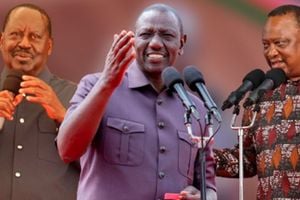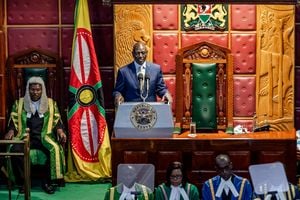Carbon markets, the new Band-Aid solution to climate change in Africa
Packaged and sold as an alternative way to mobilising the increasingly diminishing climate finance in a win-win compromise or wooing private sector investment in climate change mitigation, carbon markets could be the new Band-Aid solution to climate change, rekindling colonialism in the African continent.
A closer look at how colonial thinkers justified and legitimised colonialism, including facilitating the conversion and salvation of indigenous peoples and localising Christianity while claiming Christian lands, falls not so far away from the theories and means through which carbon markets have been introduced to the African continent.
Among the overused phrases while propagating carbon markets include, but are not limited to, “restoring natural capital and land”, “reconciling people with nature”, “providing alternative ways to mobilising climate finance”, and “enhancing nature-based solutions”.
Yet, it is evident that amidst all these “green terms”, community rights and land are increasingly taken away in the name of “conservancies for credits”, especially in the Arid and Semi-Arid Lands like Samburu, Isiolo, Marsabit and Turkana.
The situation is similar in the coastal region, where project developers engage in carbon markets disguised as foreign aid, especially those working through water, sanitation, and hygiene pathways to earn carbon credits.
In climate dialogues, songs and sounds of the former scramble for Africa are the loudest.
For instance at the first Africa Climate Summit, the resultant declaration points to avenues and pathways to and or for “cooperation” to activate carbon markets and carbon finance in the global south with the framing and packaging of “opportunities Africa offers the rest of the world in the fight against climate change” .
At the national level, the number of outstanding memorandums of understanding and letters of authorisation under Article 6 awaiting signatures is countless. All these are aimed at operationalising and approving compliance and voluntary trading on credits, respectively. The situation is further augmented by international goings-on, such as the enactment of the Carbon Border Adjustment Mechanism (CBAM) by the European Union, which has seen Western companies run to developing countries to “lower their emissions” cheaply at the expense of the rights of local rural communities and indigenous people in Africa.
Even with these countless efforts (including forceful institutional arrangements, policy, legislation and regulations realignments) to promote carbon markets in Africa, pertinent issues, including human rights violations of carbon markets, the nature of these markets, and carbon markets emission reduction realities, additionality, and verifiability remain unanswered.
The Middle East Eye newspaper recently reported that a carbon offset deal could see Liberia concede 10 per cent of its territory to a private Emirati company, extinguishing customary land rights and giving the United Arab Emirates (UAE) pollution rights equivalent to the forest’s carbon sequestration.
The same newspaper, not long afterwards, reported that a Dubai-based firm, Blue Carbon, has signed a framework of collaboration (FOC) with Kenya’s State Department of Environment and Climate Change that would concede “millions of hectares” of its territory for producing carbon credits.
This followed a slew of similar contracts with Tanzania, Zambia and Zimbabwe, which revealed 7.5 million hectares, a fifth of its landmass, to the company in the name of carbon markets and credit generation.
Furthermore, in Kenya, a project in Ukambani that claims to protect forests and wildlife has been accused of displacing and dispossessing local communities, violating their land rights and cultural practices, and failing to deliver the promised benefits. The project sells carbon credits to corporations and individuals.
The affected communities have filed a lawsuit against the project developers, alleging fraud, coercion, and human rights violations. In Uganda, the Bukaleba Forest Reserve carbon offset project, which aims to establish pine and eucalyptus tree plantations, has evicted thousands of people from their ancestral lands, destroying their homes and crops.
The project has also caused environmental degradation, biodiversity loss, and water scarcity. The project is part of the Clean Development Mechanism (CDM), a carbon market scheme under the Kyoto Protocol, and sells carbon credits to European companies. The displaced communities have protested and resisted the project, demanding justice and compensation – all landing on deaf ears. Akin to the struggle for self-governance during colonial times.
Nonetheless, on the other side, Africa is beginning to tap into this lucrative resource, carbon.
According to a few project developers in the field of carbon, a more coordinated effort across the continent could even reap richer benefits from carbon trade than imagined.
With climate finance generally diminishing, market-based mechanisms such as carbon markets could be essential for mobilising private sector finance.
Similarly, proponents of carbon markets have associated the same with enhanced resilience with an argument that carbon markets could support adaptation to the impacts of climate change by financing adaptation measures, such as improving water management, agriculture, health, and disaster risk reduction. These measures can increase the resilience and well-being of vulnerable populations and ecosystems such as Africa.
However, some challenges and risks are involved, such as ensuring environmental integrity, transparency, fairness, and participation in the design and implementation of carbon market mechanisms.
African countries or entities need to carefully assess the opportunities and challenges of carbon markets and engage in global dialogue and cooperation on this issue before entering into bilateral memoranda of associations to activate such dialogues.
The author is a climate finance and innovations officer at HIVOS - [email protected]



